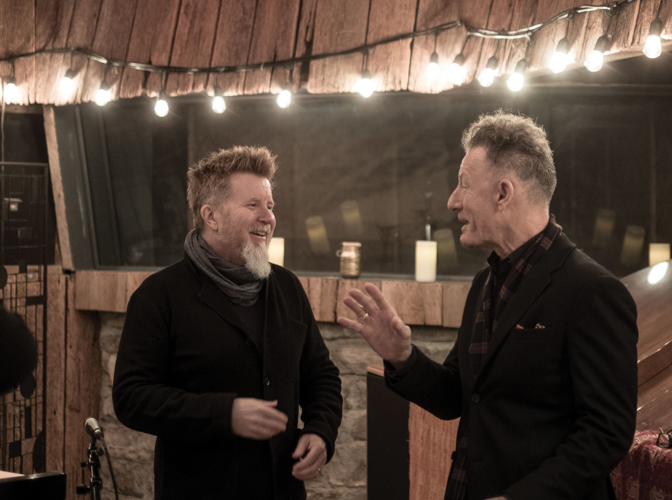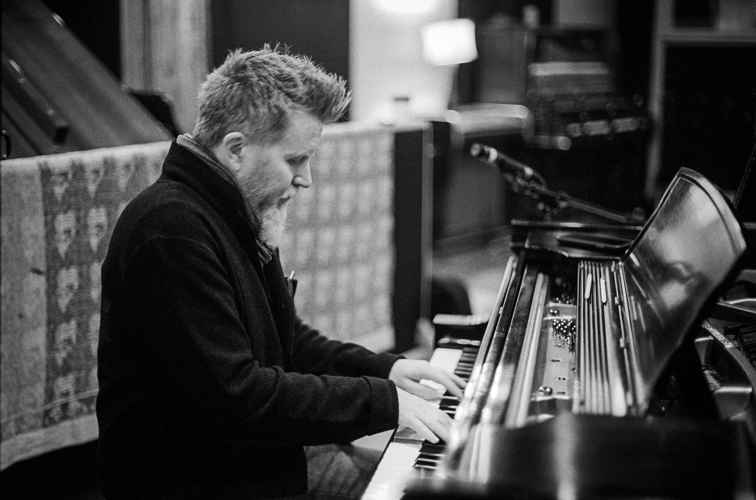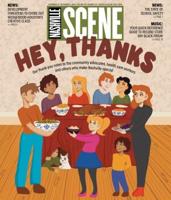
Matt Rollings and Lyle Lovett
He’s been one of the top session musicians in Nashville for three-plus decades. His name has appeared on the back (or on the inside) of more than a thousand albums, usually in some variation on this phrase: “Piano: Matt Rollings.” But with his first solo album since 1990, Rollings’ name is now on the front of the record. The new record was released on streaming services last year, but it was only this month that it was released on vinyl. And there it is: a black-and-white photo of his fingers on the keyboard, the title Mosaic in big blue letters, and his own name in orange.
On first listen, the recording doesn’t sound that different from Rollings’ usual work. His skillful and imaginative piano parts frame the vocals of Willie Nelson, Lyle Lovett, Alison Krauss and others he’s worked with in the past. But the sensibility that bonds these songs into a unified album is Rollings’ taste. He chose the songs and musicians, arranged the tunes and produced the sessions.
“I treated myself as an equal partner on this record, not as a sideman,” Rollings explains over the phone from his Nashville studio. “The singers and I were equal artists. When I’m hired as a sideman, I’m there to help the singers realize their vision. This time, it was my vision. We started every session with, ‘This is my arrangement of the song.’ Sometimes they made good suggestions, but that was always the starting point.”
His first rule was that his singers couldn’t sing their own songs; they had to do one of the songs he suggested. Thus Rollings’ longtime employer Lovett doesn’t sing one of his classic compositions, such as “If I Had a Boat” (that’s done here by Ramblin’ Jack Elliott). Instead, Lovett sings Harold Arlen and Johnny Mercer’s “Ac-Cent-Tchu-Ate the Positive” (listed on the jacket as “Accentuate the Positive”). Nelson, who has won two Grammys with Rollings-produced albums, joins Lovett and Elliott to sing “That Lucky Old Sun,” the 1949 standard Nelson had once sung with Kenny Chesney.
Nashville duo The War and Treaty sing Paul Simon’s “Take Me to the Mardi Gras” and then join The Blind Boys of Alabama on the old spiritual “Wade in the Water.” Krauss joins Vince Gill to sing “Stay,” a song Rollings wrote with Alisan Porter, the 2016 winner of The Voice. It’s no accident that these songs all reside in the overlap between jazz, blues and country — the land of extended chords, syncopated rhythms and accessible storytelling — because that’s where Rollings feels most comfortable.
That’s why Nelson has turned to Rollings to co-produce the legend’s three latest American Songbook albums. The first, 2016’s Summertime: Willie Nelson Sings Gershwin, won a Grammy, and so did the 2018 Sinatra tribute My Way. Rollings’ third collaboration with Nelson and co-producer Buddy Cannon is That’s Life, another Sinatra tribute released just this year and a likely contender for next year’s Grammys.
“When I started with the arrangements for the Gershwin album,” Rollings recalls, “I was looking for a sound that felt at home in the jazz world, where the musicians knew that vocabulary and knew how to swing. But I also wanted it to be accessible to a non-jazz audience. That reminded me of Half the Perfect World, that Madeleine Peyroux album produced by Larry Klein. It sat in just the right place: It swung but didn’t go too far out. So I hired the rhythm section from that album: Jay Bellerose on drums, David Piltch on bass and Dean Parks on guitar.”
To this foundation, Rollings added steel guitarist Paul Franklin to echo the country-jazz fusion that Nelson grew up on as a Bob Wills fan. Rollings then wrote charts for a horn section and a string section to fill out the sound. But in the end, all three titles were unmistakably Willie Nelson albums.
“There are three things that make an album a Willie record: Willie’s voice, his guitar Trigger and Mickey Raphael’s harmonica,” Rollings says. “Once Willie starts singing, it feels like he was always meant to sing that song. Lyle’s like that. And Mickey knows how to play around Willie; he’s got great radar in that way. That mixture of jazz, blues and country is such an interesting hybrid. I never knew what to call it, so I just refer to it as Texas music, because most people from there seem to have it.”
In 1981, Rollings was an aspiring 17-year-old jazz pianist, when he was asked to audition for the suddenly vacant piano chair in J. David Sloan & the Rogues — the house band at Mr. Lucky’s, the biggest honky-tonk in Phoenix. The gig was playing whatever the top-40 country hits of the day were, as well as country standards from the past. He was soon told by the band’s veterans: “What you’re playing is great for jazz, but your job here is to play rhythm.” So he mastered that job.

The band was hired as the country band at an international festival in Luxembourg. When the band took a break, a skinny Texan fresh out of college would play solo acoustic songs between sets. Almost completely ignored by the crowd, the kid asked Rollings and his bandmates if they would learn five of his songs and back him up. They agreed. The kid was Lyle Lovett, and the songs included “Cowboy Man,” “God Will” and “If I Were the Man You Wanted.”
“I had never heard anything like him,” Rollings remembers. “The songs were country but not really. He’s an amazing singer, but he doesn’t wear it like that. It was really compelling to hear this unassuming young guy sing these compelling songs. His hair was really high even then. He was the complete package.”
The musicians bonded, and Lovett traveled to Phoenix to cut his audition demos for a Nashville publishing deal. Rollings played electric keyboards and recommended a local singer, Francine Reed, to sing backup. The pianist then went off to study jazz at Berklee in Boston. It was there he got a call from Lovett, who said that he landed not only the publishing deal but also a record deal with MCA. Producer Tony Brown wanted to use the Phoenix demos as the basis of Lovett’s first album, but wanted to replace the keyboards with acoustic piano. Lovett insisted that they use Rollings. Rollings went on to play on every album Lovett has ever made.
“In addition to being a jazz guy,” Rollings recalls, “I liked Steely Dan, James Taylor and Jackson Browne. I noticed that a lot of the same names played on those records, and I realized that playing on records might be a career. When I got a bigger-than-expected check from the Lyle record and Tony invited me back to Nashville for some more work, that convinced me where my career was going. And at the end of 1986, I left Berklee after five semesters and moved to Nashville. I had just bought a pickup truck, so perhaps I was destined to go into country music.”
After a transition period, Rollings was working three sessions a day behind artists such as George Strait, Randy Travis, Patty Loveless, Wynonna Judd and Clint Black. “I loved it,” he says. “That time period in the ’90s was a really amazing era for country music. I usually got hired as a pianist, not a keyboardist, so not only did I get to be on some classic country recordings, but I also got to develop a unique voice in town. And I got to play with literally the best session players in the world: Steve Gadd, Brent Mason, Larrie Londin, Michael Rhodes and many more.”
Working in the studio with producers such as Tony Brown, Jimmy Bowen and Garth Fundis, he got interested in producing himself. After some indie projects, Rollings got the shot to produce Keith Urban’s first American solo album, a self-titled effort, in 1999. That record yielded three top-five singles, and Rollings was on his way as a producer. He wound up producing three albums for Mary Chapin Carpenter, including 2014’s Songs From the Movie, a lavish orchestral reinterpretation of her earlier songs. Carpenter, Rollings and co-producer Vince Mendoza toured behind the album with a different orchestra in each city.
In England, their opening act was a Lovett-like kid named Benjamin Scheuer. Rollings bonded with him and recently contributed piano to Scheuer’s “Empty Stage,” a song about all the theaters left vacant by the pandemic. It was turned into an extravagant video that became a minor sensation in the U.K.
“Benjamin is this amazing composer and singer-songwriter — an extremely talented storyteller,” Rollings says. “He writes songs that make me cry. He’s just one of those people.”
Scheuer joins the hundreds of singers who have benefited from Rollings’ piano playing. And now Rollings is being helped out by some of those singers on his own record. It’s not an easy journey to move your name from the small type on an album’s back cover to the large type on the front. But Rollings has pulled it off and few have deserved it more.






